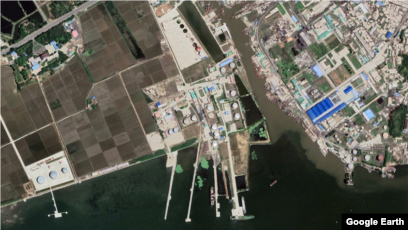This article was originally published on VOA and translated by OKN Correspondent.
China and Russia have not officially supplied oil products to North Korea that can be used for fuel, but large tankers are still coming and going at North Korean ports. At least three tankers were spotted at Nampo Port last month alone, raising the possibility that up to 100,000 barrels of refined oil flowed into North Korea. Ham Jiha reports.
On May 7, a tanker estimated to be 85 meters long appeared at the oil loading dock in Nampo, North Korea. The tanker was spotted by Planet Labs, a daily satellite image service provider. The ship was not captured in images taken from May 3 to 5. When considering this fact, the tanker anchored at the port either on May 6 or 7.
The ship’s location is at the end of a pier, which extends about 300 meters toward the sea, with dozens of oil tanks concentrated on the other side of the land. Generally, oil-handling docks are built as far as possible from land due to the risk of fire, as is shown in this case. There is a possibility that an oil tanker carrying gasoline, diesel, or other oil products arrived at the dock.
The tanker, which stayed in the same place until May 10, is not seen in satellite images taken on May 15. Considering that satellite images cannot be thoroughly viewed due to thick clouds around the area between May 11 and 13, it is suspected that the tanker left the site between May 11 and 15.
However, on May 17, about two days later, a new ship that appeared to be a tanker was spotted at an offshore oil unloading facility about 600 meters east of the site. An offshore oil unloading facility is a place where oil can be transferred to land through pipes in the middle of the sea.
The tanker found on that day was about 70 meters long. It was confirmed to have stayed until May 27, but satellite images on May 31 do not show its location as if it had left the site.
Meanwhile, another 85-meter tanker, which is the same size and shape as the ship spotted earlier, reappeared on May 24 at the oil loading dock connected to land. As of May 31, the ship remains still at the site.
This confirms that at least three oil tankers entered and left the oil port in Nampo, North Korea, over the past month.
The 50 United Nations member states, including the United States, previously submitted documents to the UN Security Council saying that the amount of oil that can be shipped per tanker entering Nampo is at least 7,000 to 33,000 barrels. If this calculation is applied to the three ships discovered last month, it means that the amount of oil brought into North Korea that month could reach from at least 21,000 up to 99,000 barrels. This is about 4 to 20 percent of the 500,000 barrels of oil that the UN Security Council allows North Korea to import per year.
The problem is that the source of the refined oil brought in like this is unclear. VOA reported earlier that China’s oil supplies to North Korea include lubricating oil and asphalt, not gasoline or diesel that are directly used for fuel. The report was based on the country’s official filings with the UN and its Maritime Customs Service records.
Likewise, Russia reported zero monthly supplies of refined oil to North Korea from October 2020 to March this year, saying it has not supplied oil to the North for more than a year.
This means that North Korea is not officially importing fuel from either country. However, this is a less realistic report given the continuous arrival and departure of oil tankers that are spotted in North Korea. Therefore, for now, it is estimated that North Korea relies on smuggling oil imports.
In fact, suspected ship-to-ship transfers have frequently been detected in the West Sea of North Korea. The same problem has continued to arise in the sea near Taiwan in the past.
The UN Security Council mentioned the issue for the first time in Resolution 2375 adopted in September 2017. This followed criticism from member states that North Korea traded sanctioned products on international waters. The Security Council prevented ships representing North Korea from receiving any goods on the high seas.



